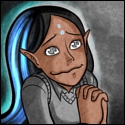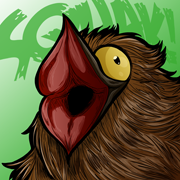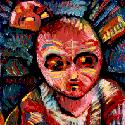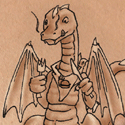|
So! I'm making this thread to discuss topics related to the making of games, and how to make them, and how people want them made. The first subject I want to bring up is editing! Editing is a subject that often gets brought up, but usually people only mention it if they think there wasn't enough of it. "Did nobody edit this game?" we cry. "Did White Wolf seriously have a corebook crowd-edited by Scribendi.com?" I want to hear your thoughts on games and editing! My basic experience is that getting a game edited is hard, because you're asking for something that's much different than getting someone to edit your novel. Everybody knows how to read a novel! But not everybody understands games, and you need your editor to understand your game to do her job. If your product is a 280,000-word narrative system with eight different colors and some cards... that can be difficult to find. The twin problem is that if someone does understand your complicated gaming system, they may already be too close to it to figure out how it looks to anybody who isn't familiar. This is why I can't do any editing on stuff like Chuubo myself; it all makes sense to me already and I have difficulty figuring out which parts are going to be hard to understand. (Also I tend to have three or four older drafts that got floated by me in my head that I confuse with the final text.) You also tend to end up in a situation where the people who are prepared to edit your book are already your fans/friends, which is a problem of its own. I recently saw somebody advertising his services as a gaming editor, calculated Chuubo against his rate on a whim, and got an figure of about ten thousand dollars. I think that is quite possibly fair for someone who's going to spend as many hours as it's honestly going to take, but it's not surprising that most people don't go for that. So! Tell me your thoughts and war stories!
|
|
|
|

|
| # ? Apr 24, 2024 20:39 |
|
Editing RPG books is really an exercise in technical writing and, to quote one particularly memorable phrasing from an old Exalted thread, "most professionals aren't willing to accept payment in cartoon moths flying out of a wallet." So there's that barrier, coupled with the difficulty in understanding the readers' needs you mention. I wonder - how difficult would it be to put together a template for gamebooks? Ideally, something ready-to-use with PDF creation software. You could incorporate basic stylistic guidelines and best practices into the template itself - page numbers on lower-left corner, flags that make sure headers and at least a significant amount of text body are always on the same page, a button for quickly flagging text to go into an auto-compiled index, word-wrap that plays nice with art, etc. It might sound like I'm unfairly ragging on White Wolf/Onyx Path here, but these are honestly problems I've seen in Dungeons and Dragons up until Fourth Edition, so I'm hazarding a guess that a lot of it is just cargo-cult design. Which is exactly my point - hasn't tabletop gaming been around for long enough to start having general rules and standards?
|
|
|
|
Cargo-Cult design is probably a good way to describe it. I know that when I start working on a book I just think of a book from my collection that's fairly close to what I'm trying to write in terms of ideas and length and that I personally think "this looks pretty good" then I just kind of ape its formatting. I've even found myself doing the same thing with my own stuff...I come to a chapter and try and think about how I put it together, title it, etc...so I just look at the last thing I did that was fairly similar and see if that works. It's all very seat of the pants. Of course, this is all fairly theoretical for me. The only books I've worked on that were professionally produced were formatted and edited by someone else entirely without my involvement.
|
|
|
|
My experience with making games is extremely minor. My father helped write quite a few Traveller supplement books and he used me for "playtesting" for the Career Books they did, though that meant "hey, can you roll up a bunch of characters for me?" and I did. My gimmick was my characters all moved from one career to another, and a reviewer for the book was happy to see mixed-career characters in the "example characters" section for quick NPCs, so yay for me. That said, there really wasn't any real playtesting done. As far as I could tell, there wasn't any effort to really balance the careers with each other (or with the Traveller core book, since they were a third-party company), and the test draft they sent me to roll up characters completely the same other than a few pages of tutorial text. Since editing seems to be the conversation right now, I'll get a hold of him and ask about the editing process for these books, because my dad got paid by the word to write for the books. It was extremely little, I think the most he got from a book was like $60. But the company was a small 4-man group, and each book was about a 100 pages. While nothing compared to the juggernauts that are Exalted and Chuubo to edit, I'm sure I can get a few stories there. And probably with the art as well, going through the books my dad wrote a few of them straight up has Poser art for the cover.
|
|
|
|
Thesaurasaurus posted:Editing RPG books is really an exercise in technical writing and, to quote one particularly memorable phrasing from an old Exalted thread, "most professionals aren't willing to accept payment in cartoon moths flying out of a wallet." So there's that barrier, coupled with the difficulty in understanding the readers' needs you mention. I wonder - how difficult would it be to put together a template for gamebooks? Ideally, something ready-to-use with PDF creation software. You could incorporate basic stylistic guidelines and best practices into the template itself - page numbers on lower-left corner, flags that make sure headers and at least a significant amount of text body are always on the same page, a button for quickly flagging text to go into an auto-compiled index, word-wrap that plays nice with art, etc. To the bigger point, however, I think part of it is just the nature of the process: Bad editing stands out, good editing makes itself ignored. And mediocre editing is only really noticeable to people with enough experience to disqualify themselves from being within the price range that led to the mediocre editing in the first place. That having been said holy poo poo the indexing feature in InDesign is SO GOD drat EASY TO USE and I'm never, ever going to shut up about it.
|
|
|
|
A lot of game designers forget what their book is supposed to actually do, and it makes the game much less convenient/fun for the people running or playing the game. Things like in-character explanations of rules that are needlessly obtuse and confusing. Or in a more recent bit, the new Accursed Kickstarter is for a series of setting books. The format will go over a given area, list an important NPC or two, and then list a new monster in that area. The problem with this is that if you're trying to use the book to run a game, and you've got several monsters in an encounter, you're going to be flipping around the book trying to find the exact monster you're looking for. Add in the fact that they refuse to include an index, and it becomes very difficult to use the book for its actual purpose: Running a game of Accursed.
|
|
|
|
So my friend is designing a RPG and has been extensively documenting his process through my podcast. We've done a series called Game Designer Workshop (no relation to the company) about his game: http://slangdesign.com/rppr/category/game-designer-workshop/ He's posted a recent update on his blog about progress on the game: http://hebanon.blogspot.com/2016/01/new-strategy-red-markets-progress.html I'm posting recorded game sessions from the first playtest campaign on my AP podcast feed: http://actualplay.roleplayingpublicradio.com/2016/01/genre/horror/red-markets-beta-the-brutalists-episode-1/ It's been a long journey but Red Markets is doing pretty well. It might be useful to listen to some of the GDW podcasts to hear about what mistakes he made or ask questions on the podcast site so Caleb can answer them.
|
|
|
|

|
| # ? Apr 24, 2024 20:39 |
|
Thesaurasaurus posted:Editing RPG books is really an exercise in technical writing and, to quote one particularly memorable phrasing from an old Exalted thread, "most professionals aren't willing to accept payment in cartoon moths flying out of a wallet." So there's that barrier, coupled with the difficulty in understanding the readers' needs you mention. I wonder - how difficult would it be to put together a template for gamebooks? Ideally, something ready-to-use with PDF creation software. You could incorporate basic stylistic guidelines and best practices into the template itself - page numbers on lower-left corner, flags that make sure headers and at least a significant amount of text body are always on the same page, a button for quickly flagging text to go into an auto-compiled index, word-wrap that plays nice with art, etc. I think one of the things to remember is that most RPGs aren't actually an industry; they're more like a super-expensive hobby that people can buy into. There's no standards because there's no professionalisation, even if a lot of people wish that were the case. A vast majority of RPGs, like probably most of them except maybe D&D and even more maybe a few others like WW, evil hat, and mongoose, are essentially outsider art. I think this ties into the general overestimation TTRPG roleplayers tend to have as to how much of A Thing the hobby is.
|
|
|














